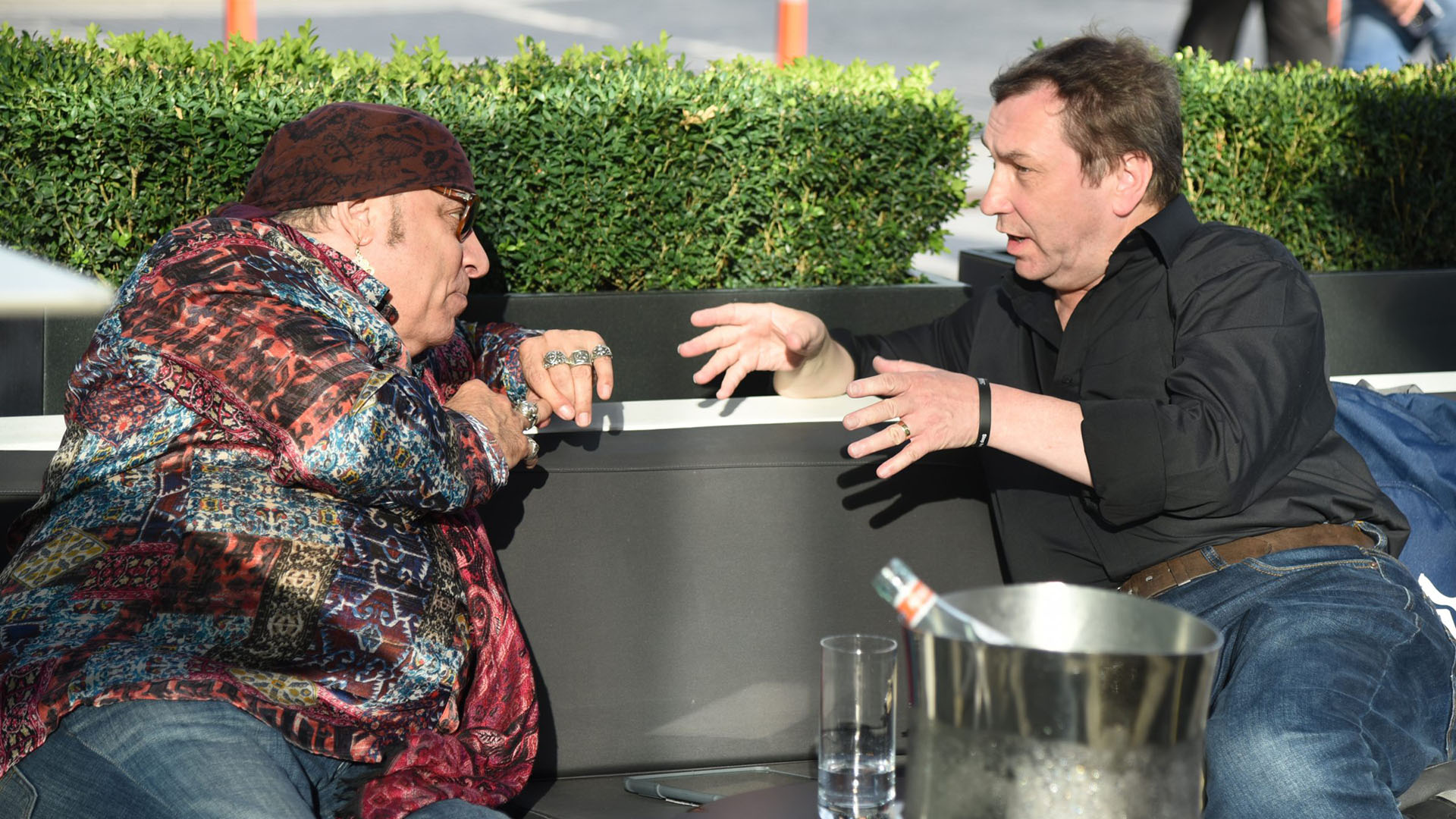Before he took to the stage for a blistering concert at Dublin’s Vicar Street Folk and Tumble caught up with Steven Van Zandt at the Marker Hotel for a chat about music, acting and his wardrobe.
FT: You’ve been busy Steve?
LS: A little bit.
FT: So you’re half way, two thirds though this tour, Manchester last night. Do you get do see much of the cities you pass through?
LS: Well I make a point of playing every other day, so that we can to a town, and go out like this or go out to dinner or whatever, and meet some of the fans, like we do tonight at Tower Records, (where he will record his hugely popular Underground Garage Radio show), and then we play the next day, so you know, we always get the one day in town to feel it out, and live it.
FT: An artist of your stature doesn’t normally do smaller fan-friendly gigs like the radio show, where you are meeting the people who go to the shows and buy the records?
LS: Well you don’t want to be trapped in a hotel room. Some people do this thing for different reasons. For me it’s a lifestyle, a lifelong lifestyle really. So I don’t really try and go out and make as much money as I can and then go and live my life. This is my life, a large part of it.
FT: It’s the job?
LS: Yeah, you know, but it’s also literally a lifestyle. I don’t believe just in the destination, I believe the journey is just as important so you want to have a quality of life while you’re living it. You don’t want to do a bunch of work that’s separate from your life. My work is my life.
FT: And yet when you started off you felt you had made some naive choices initially. You felt the job was just rock’n’roll.
LS: Well yeah. I had approached it as an artistic adventure and as a way of learning about myself and the world. I wasn’t looking at it as a career. I never wanted a solo career. I still don’t. But looking back, I was a bit naive. I should have not produced myself, first of all, because, when an artist produces themselves, the artist takes over, and that’s a mistake. I should have found a manager and I should have had a real proper career, made sure I had a hit when I had the chance to have a hit.
It would have made life a lot easier than what I’m doing now, which is continuing to play songs for people that they have never heard before, which is what we do every day for the past two and a half years you know and we got to win them over song by song, which luckily with this band we do. But I got to be, probably the only band in history, touring extensively, without any commercial success, none.
FT: When you say you would want a producer for those early records, those albums still stack up today. They sound great. What would change about the sound?
LS: They sound great, but keep in mind, I see myself as a writer, producer, first. I didn’t see myself as an artist having a career. I looked at it as a producer, but when I say the artist took over for those first two albums, the artist wanted those productions to be unique, and you don’t need the productions to be unique. You need the songs to be unique, and the songs were unique enough. I was unique enough without having the productions on top of that being unique. The first album, I did in one day. I played the entire album live in the studio,
FT: Men Without Women?
LS: Men Without Women, yeah. I came back the second day and did the whole album again, and then spent the next few weeks, redoing a solo or two, and you know whatever. But why not produce it properly? The second album was a whole different kind of thing in my head. Then starting with the third album, it started to come together, production-wise, you know, that one sounds very good.
FT: You were getting the hang of it?
LS: Well I stopped experimenting is what happened. Stop already, you know what I mean. Just fucking produce the record! Right! I’m a lot better now. I mean these last two albums, are to my mind, two of my best. I finally learned to produce myself, like I was producing somebody else. And I’m really thrilled with the last couple of years. I think it’s the most productive of my life; the first two albums I’ve ever done in my life with the same band. And it really makes a difference, it really does.
FT: The last two albums have been very different from your earlier material, is that fair to say?
LS: Well I made a decision. I said OK if I’m going to come back into the business now, I want to do two things differently. I don’t want it to be autobiographical anymore. I’m sick of me. I’ve learned enough about the world and I don’t want to talk about politics either. I said everything I wanted to say. I said it at a time it needed to said. Politics is no longer something happening behind the scenes. It’s right in your face, 24/7. Everybody knows what’s going on in my country. Everybody knows the horrors of Brexit here, or they are about to. So you don’t have to reveal anything. It’s all right in your face now. I wanted to come back with a fictionalised palette. I want to make 12 little movies. I’ll be a different character in each one and that will be my thing from now on, and Summer Of Sorcery is that.
FT: There’s no doubting it is a great album, with a real feel-good sound. And yet, many would contend that you were the outspoken artist with a political voice. Five albums, five themed debates on particular issues, the state, economy, religion and so on. And yet people would say, with the present incumbent in the White House, the rise of racism and the far-right all over the world, this country included, now is the time for a voice like yours to be heard? You don’t get that?
LS: Yes, I think that’s a very obvious conclusion to come to. But here’s my thinking. I’ve never seen such extreme racism, white supremacism, nationalism, fascism, religious extremism. It’s all over the place, wherever you look! We are inches away from a civil war in my country. I just feel there is nothing I can add to this discussion, other than use my music as a common ground to try and bring people together. Bring people together who have opposing views, and have the communion of spiritual nourishment without rhetoric, without lyrics, without certainly political philosophy or any of that. I think that’s my usefulness. I understand people saying, you should be leading the revolution, but believe me, the revolution will be taking care of itself.
FT: I get what you are saying, but people said music wouldn’t have any effect on apartheid in South Africa, and yet Sun City had such an effect on that regime.
LS: That was a very rare complete success OK.
FT: And yet this is a very scary time right now?
LS: No, no, it’s a different subject. We couldn’t do Sun City right now, OK. We have right now a system that is not working all over the world. and people are disappointed. We have people who are working in the states, who are also homeless. People are disappointed and looking for someone different to blame. So be that the immigrant, the black guy, the Muslim, somebody else is responsible, and I don’t see the situation changing any time soon. We are all prejudiced, but civilised people can suppress it. But once you start celebrating your prejudice and your racism, as Steve Bannon goes around the country saying “wear your racism on your sleeve and be proud of it”. Once you get to that stage, it is hard to put it back in the bottle, baby you know. Same with the climate change argument. It may be late to fix the planet, but we certainly need radical, I mean radical change in terms of the environment if we are going to try and save it. I have great faith in these teenagers. Once they get to vote, we’ll be fine but that’s still a few years away.
FT: Will you play Sun City tomorrow night? I’ll tell you why the song has extra resonance in this city. In 1983, at the height of apartheid, a young Dubliner Mary Manning was sacked from her job in a shop called Dunnes for refusing to sell South African goods. She and some of her fellow workers went on strike, and it eventually resulted in a change in the law, and Ireland became the first Western country to ban the sale of South African goods. So to play Sun City in Dublin has that special resonance.
LS: Well, you’re going to get it.
FT: You may be as famous for appearing in The Sopranos, as for your music career. You were cast originally as Tony Soprano. You ended up playing the part of Tony’s right-hand man and Conseiller Silvio Dante to great effect but do you ever, in your quieter moments, or when you’re dreaming, think, I wonder, I wonder what The Sopranos would have been like if I had accepted the part of Tony Soprano?
LS: No, no. It would have been different, but obviously it ended up the way it should have been.
FT: But that’s the way David Chase wanted it.
LS: Well, that’s the way HBO wanted it. They didn’t want to give a guy acting for the first time the lead role. It would have been insane, you know. So I suppose you get a little taste of what it might have been like with Lilyhammer I suppose. But, I had seen Jimmy in several movies, and I said to the casting person, “that’s who should be playing Tony”.
FT: So you suggested James Gandolfini?
LS: Yeah. Now he was already there, in the casting for another character, but I said that’s the guy who should play Tony. He was a wonderful, wonderful character actor who took that working-class actor’s thing, into a lead role, that made so unique, and thank goodness it ended up that way cause, it introduced one of the greatest actors of all time.
FT: There was a real dark side to his character, but a real humanity, and warmth at times, that people could relate to. Those are some of the qualities you bring to Lilyhammer. There’s a very dark humour underlying the whole show. But I suppose one of the treats of the show, to me anyway, was the contrast in cultures, between the tough guy mobster of Frank and the almost anti-violent Norway culture.
LS: Yeah well that’s right. It was brilliantly conceived by a couple in Norway as the ultimate fish out of water story. You know you drop a one-man crime wave into a place where’s no crime, basically, and, you know it’s just a wonderful idea.
FT: Could it have worked in any other country?
LS: Yeah, but not as well, and I’ll tell you why. Nobody, nobody knew a thing about Norway OK. They can’t name one product, they can’t name one celebrity. Half the people think it’s a city in Sweden. I thought we are going to make Norway one of the characters in this show.
FT: I saw you being interviewed on Norwegian Television. And that’s the line you were giving the interviewer, and she didn’t know if you were taking the rise out of them or not! Could it have been set in Ireland? We have our crime wave here, so it could have been a different show? We have some great town names. It could be Ballywhoiriskey instead of Lilyhammer, What about Termonfeckin? Be a great name for a series.
LS: Well, again, almost any other country does have its own crime, so it isn’t as unique as a place where there is no crime, virtually. It’s a relatively new problem. When I first went to Scandinavia in the early 80s, they had no penal system. They didn’t know how to deal with crime, maybe because of their, a little too liberal emigration policy. I feel very strongly about emigration that it should be integrated in order to work. And obviously, with the refugees, is a whole other situation. But some of the emigrants are forced in areas in of their own, the language is a barrier to integration, they can’t get jobs, and they’ve got to feed their families, so, what are you going do? But the crime is a relatively new thing, you know it didn’t really exist there 30, 40 years ago.
FT: Although your boys in the Pink Flamingo Club, they got the hang of it pretty quickly.
LS: Well the idea in my head was the Norwegians were going to become more New York, and I’m going to become more Norwegian. That was how you saw it in that last show, the 24th show, you know.
FT: Which you directed.
LS: Yeah, I was very proud of that.
FT: Is that something you’d like to do more of?
LS: You know what, it is. I obviously observed all those years at The Sopranos, and I thought TV directing was different from film directing. It kind of looked fairly interesting, almost a bit of a traffic cop. Your kind of directing traffic on TV, that’s what it looked like to me. Rather than being the visionary. Because on TV, the writer is the boss. In films, it’s the director who’s the boss. Very different. But once I did it, I thought, you can be quite creative within the confines of the TV show.
FT: You look at TV now, and that seems to be where a lot of real quality is now, Game of Thrones is huge in terms of budget, and huge film stars are flocking to the smaller screen.
LS: I think The Sopranos changed everything. All the adult entertainment is on TV now. Look at the growth of Netflix.
FT: Of which Lilyhammer was its first show.
LS: I happened to be in the two most important places at the right time.
FT: The Sopranos and Lilyhammer.
LS: I watched adult entertainment come to TV with Sopranos, and watched it go international with Netflix.
FT: Point of reference, this side of the pond, Adult Entertainment is perhaps something else from what you mean!
LS: Well, when I say Adult Entertainment I mean…
FT: I know what you mean, but…
LS: Well it is sex and language and violence, but it’s also a depth of characters, multiple characters, multiple plots, a bit more intellect required to actually follow it through. it’s adult in every way, you know.
FT: Last time you played Dublin, it was one of the most vibrant, energetic, colourful shows I’d seen in a long time.
LS: Well thank you.
FT: And you yourself. You have always been extremely sartorially eloquent, starting off in the ‘Miami Steve’ days.
LS: Well that’s a wonderful way to put it.
FT: There’s no chance of you getting knocked down at night, put it that way. Where did your style and love of colour come from?
LS: It was when we grew up man, our standards were set, by what I call the renaissance period of the 50s and 60s. And I call it that, because the greatest art, was also the most commercial. Part of the communication of rock’n’roll is the look. I mean the Beatles, there was more discussion about their hair than the music. The clothes, it’s all part of the same communication. It’s a whole presentation, music is part of it, but it’s not everything. It’s the clothes, it’s the presentation, it’s the method, production, it’s the lights, the staging. You know it’s all counts man! The music is where it starts, and where it ends, but all that stuff is considered part of your communication. And when you see the show tomorrow, and if you think the last show was colourful, that was black and white, compared to this one.
FT: As if I wasn’t looking forward to it already. But your daywear is not exactly demure either?
LS: It’s just me, you know. I not really a stylish person
FT: Well, you walked across the hotel reception, and people turned to look!
LS: Well that’s just me. That’s how I feel comfortable. I don’t know, It’s maybe part of my attention deficit disorder. I just get bored quickly and I like colours. What can I say? The 60s was my era man. I’m not nostalgic about the 60s. I never left. I’m still there. It’s 1967 for me every single day.
FT: You have had an amazing career. Eight solo albums, including the Artists Against Apartheid one, the music and magic you made alongside Bruce,two Fantastic landmark TV series behind you. Your career is obviously far from over, but what would you want to be remembered for most?
LS: Well…
Steven Van Zandt is a founding member of the Teach Rock Foundation.





